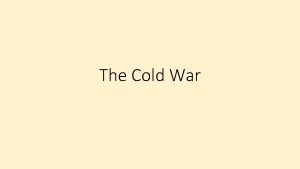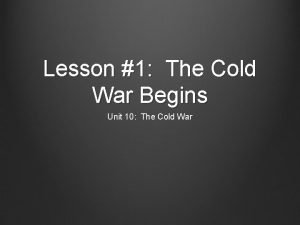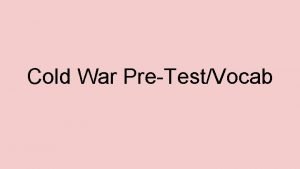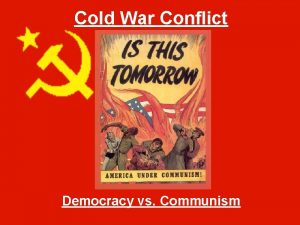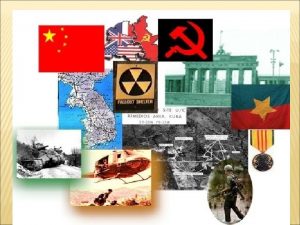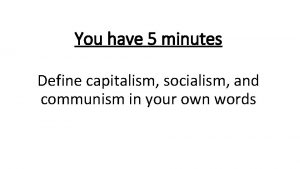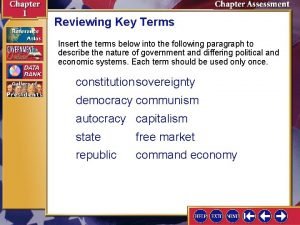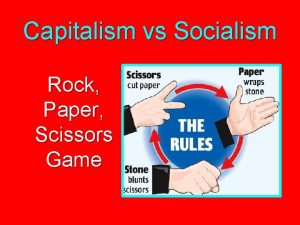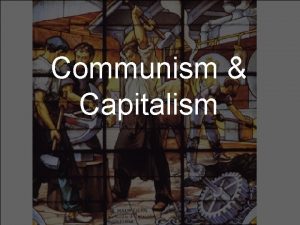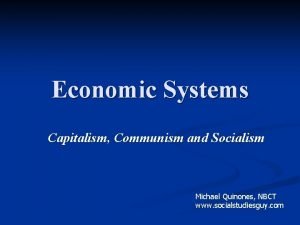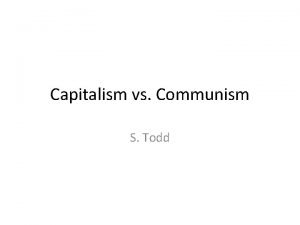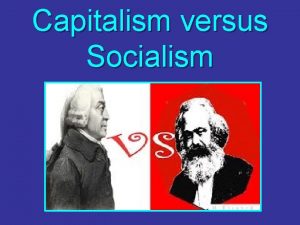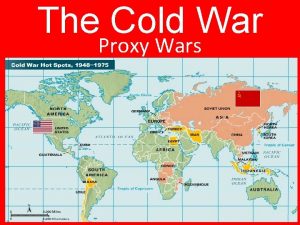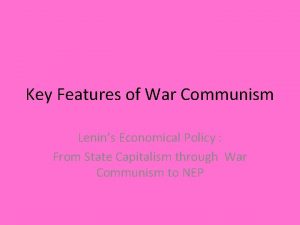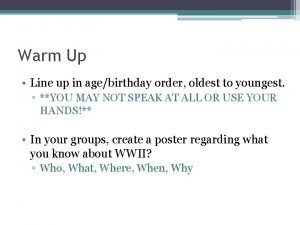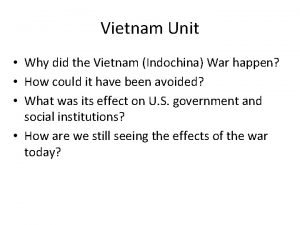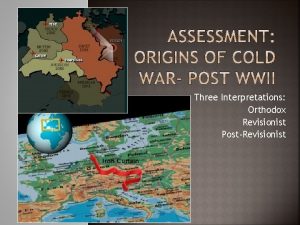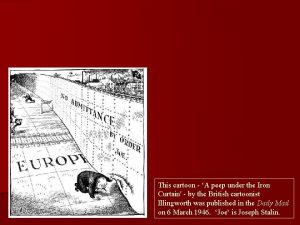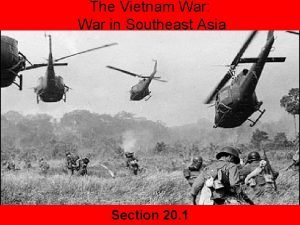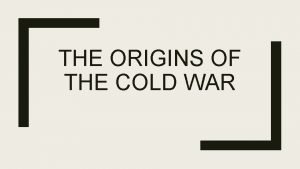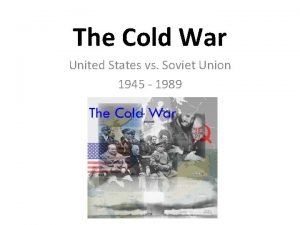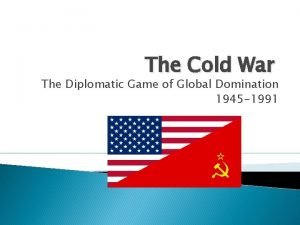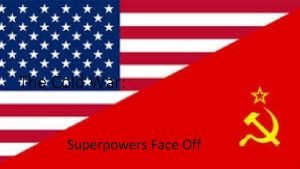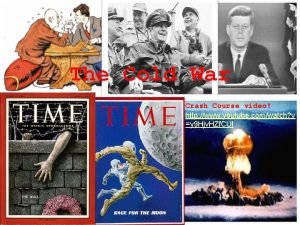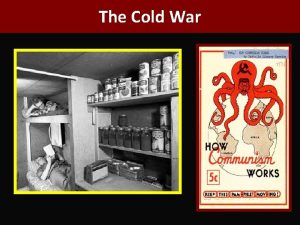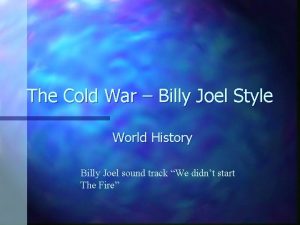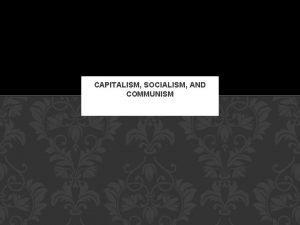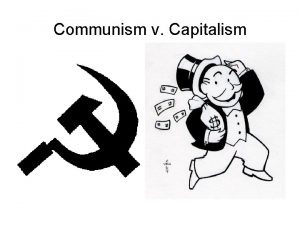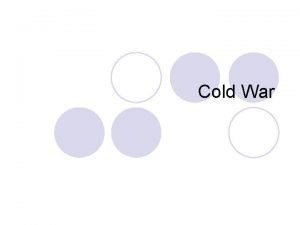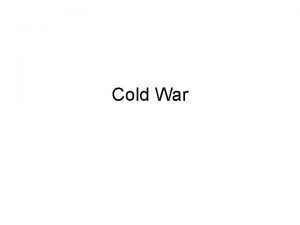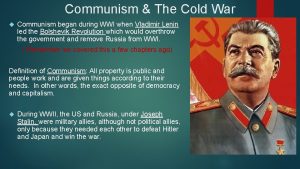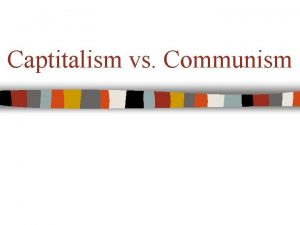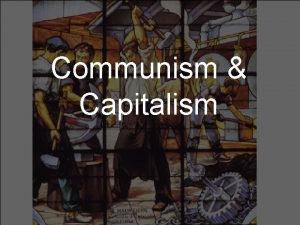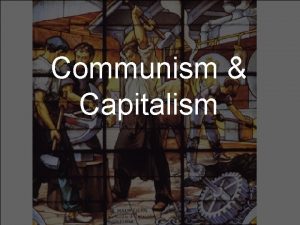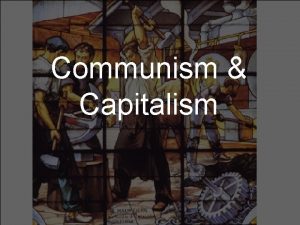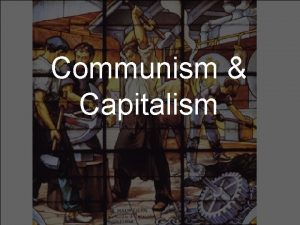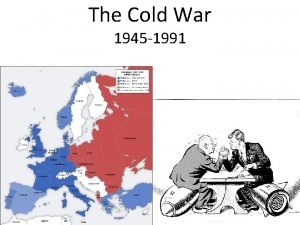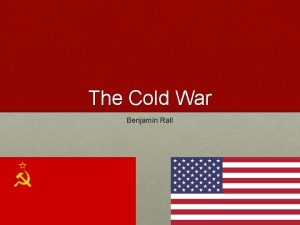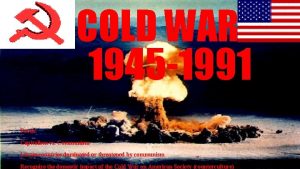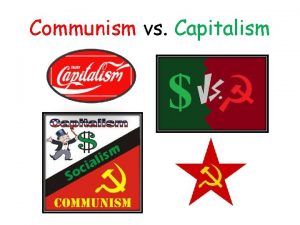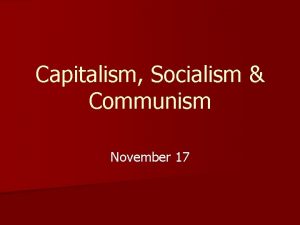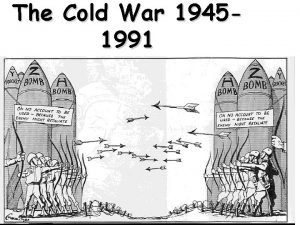The Cold War Capitalism vs Communism Capitalism system





























- Slides: 29

The Cold War

Capitalism vs. Communism • Capitalism: system that encourages independent competition and private ownership of resources to drive the economy. • Celebrates human nature (USA) • Communism: system where the gov’t owns and controls resources to protect society from competition. • Suppresses human nature (Soviets) • America fear Soviet sabotage - Soviets fear American greed

The Cold War • U. S. and Soviet Union were in a state of war without actually going to war for 45 years. • Soviets – built communist buffer to defend themselves • America – built community to encourage open trade and diplomacy

Yalta Conference • meeting between FDR, Stalin, and Churchill to determine handling Europe after WWII. • Allow communism in Poland, vote in the future • Divide Germany into 4 zones • Allow European countries democratic elections • Stalin immediately violated agreement • Wanted communist allies • Didn’t trust America.

Truman Takes Over • FDR = reason with Stalin and Soviets • Truman = refused to bargain with Stalin • Reasoning with Hitler caused WWII • The Iron Curtain: name given to communist satellite states in Eastern Europe after WWII.

The Truman Doctrine (1947) • U. S. will contain communism where it exists, Soviet system will eventually die if it doesn’t spread. • Used Navy to protect Iran • Used money to protect Greece and Turkey • The Marshall Plan: used $12 Billion to rebuild parts of Europe destroyed by the war. • Iron Curtain rejected it • U. S. allies recovered from the war faster, opened U. S. markets, prevented them from becoming permanent drain on U. S. • Soviet coup in Czechoslovakia caused many Americans to finally accept and adopt the plan.

The Berlin Airlift (June 1948) • Britain, France, and U. S. merged their zones in Germany into one country, West Germany • The Soviet zone became East Germany –Berlin was there • Soviets blockade to west Berlin – became symbol of Cold War. • U. S. air force dropped 2 million tons of supplies into west Berlin for 10 months • Stalin eventually lifted blockade

NATO vs. Warsaw Pact • North Atlantic Treaty Organization: 12 countries defend each other if attacked by Soviets. • Western Europe, Canada, and U. S. • Warsaw Pact: alliance of Soviets and rest of Iron Curtain.

Economy After WWII • Most consumer goods were unavailable during the war = people saved money • $6 Billion in tax cuts gov’t. reduced spending after the war • G. I. Bill allows veterans to more easily get jobs and education. • Depression appeared to be over • Inflation became major problem = price control boards • Labor unrest in coal, automobile, and railroad industries gov’t forces businesses to cooperate.

Truman’s “Fair Deal” • 21 point domestic reform plan following WWII • raise minimum wages • permanent Fair Employment Practices Act • revamp public housing • public health care insurance • long range public works programs.

1946 Midterm Elections • Republicans regained control of Congress on the issue of reduced gov’t. spending • Rejected nearly all of the Fair Deal • Began to chip away at as much of the New Deal as possible.

Election of 1948 – Biggest Come from Behind in U. S. History

Presidential Election of 1948 • Perhaps biggest come-from-behind upset in U. S. history. • Looked as though Truman would lose • Party was fractured, some disliked his controversial stance with Soviets, others disliked his support for civil rights amendment. • So far behind they stopped taking polls in September • In July Truman called special Senate meeting to allow them to install their campaign plans. • When they didn’t, he attacked Dewey and Republican party and won election by narrow margins.

1949 – Big Year for the Cold War • Soviets test first atomic bomb much earlier than U. S. expected • Communist revolution in China = allies with Soviets • Growing sense “We are losing the Cold War” • Japan is only real ally in Asia

Korea After WWII • U. S. and Soviets divided the country along 38 th parallel after removing Japanese soldiers. • North Korea = Communist Russia • South Korea = Capitalist America • North Koreans wanted to unify. • June 1950, North Korea crossed 38 th parallel • Threatened U. S. “containment” policy • Looked bad for America

• U. N. invasion led by America saved South Korea • September 1950 – U. S. soldiers invaded North Korea • China enters - war becomes a stalemate Massive U. S. invasion along the Inchon Peninsula pushed North Koreans back and saved South Korea. Reminiscent of Normandy and Iwo Jima invasions.

Mac. Arthur vs. Truman • Gen. Douglas Mac. Arthur wanted to declare war on China and use atomic weapons. • Truman feared war with China would trigger WW 3 in Asia. • Public battle ended when Truman fired Mac. Arthur.

Eisenhower Takes Over • Election 1952: Truman chose not to run – Eisenhower won in landslide. • Made ending the war at all cost top priority. • Publicly visited troops with support – privately he threatened atomic weapons if China didn’t stop. • July 1953, armistice ends combat in Korea • No official peace treaty ever signed • WE’RE STILL THERE TODAY! • Korean War made communism in Asia a priority (Viet Nam)

Covert Operations • Iran: prime minister ready to make oil agreement with the Soviets • CIA agents organize riots in the street • Had prime minister removed • Replaced with pro-American shah • U 2: sophisticated U. S. spy plane designed to fly over soviet territory and take surveillance. • Soviets shot one down weeks before historic summit with Eisenhower. • Produced the pilot when Eisenhower denied it.

American Communist Paranoia • Republicans vs. Democrats to prove who was better at fighting communism. • Truman issues review of gov’t employees to investigate rumors of Soviet spies. • Fuels fears, not calm them • HUAC : House Un-American Activities Committee, used by the FBI to hunt communists and tap thousands of phones.

Hollywood on Trial • HUAC hearings to determine if writers, actors, directors, etc… put communist messages in films. • Over 150 people “Blacklisted” if they refused to cooperate with HUAC. Ronald Reagan, president of the screen actors guild, testifies before HUAC that there are members of the Communist party in Hollywood.

The “Pumpkin Patch Tapes” • Alger Hiss: diplomat to the U. N. was accused of being a spy by editor of TIME magazine, Whittaker Chambers • Chambers, former communist – publicized information after statute of limitations ran out. • Hiss sued Chambers for slander • FBI found taped evidence hidden in a pumpkin at Chambers’ farm. • Incident confirmed U. S. fear of gov’t infiltration.

The Rosenberg Trial: New York couple, members of Communist Party, accused of giving nuclear secrets to the Soviets. • Many believed they were victims, not spies • Executed anyway, Americans fear neighbors.

Mc. Carthyism • Joseph Mc. Carthy: first term Wisconsin Senator claimed over 200 spies undermined U. S. from within the state department. • Led subcommittees to raid offices and badger Congressional witnesses without evidence. • Mc. Carthy’s downfall – accused the Army itself • Mc. Carron Act: response to Mc. Carthyism, required all communist organizations to register with U. S. gov’t. • Communists couldn’t get a passport or leave the country • Could be arrested or detained at any time • Gave FBI under J. Edgar Hoover authority to hunt possible spies and harass communists.

Impact • Republicans in Congress effectively harmed reputation of Democrats by the end of Truman’s presidency. • Soviets ahead in the Cold/Nuclear War • Spies infiltrating U. S. gov’t. • Subliminal messages in movies • Even our neighbors might be spies. • Popular message of the Twilight Zone shows – Americans feared nuclear destruction and possibility of being left isolated • Bomb shelters, air raid drills, and propaganda constantly reminded Americans of dangers • Promise of cheap electric enticed them though.

Kennedy and the Cold War (pg. 832 -834) • Losing the space race • Sputnik - Soviets launched the first satellite into space in 1957 • 1961 Soviets sent first human into orbit • Kennedy makes space program priority • John Glenn is first American to orbit the earth the next year • By 1969 Neil Armstrong and Buzz Aldrin first humans to walk on the moon • Needed to prove American technology better than Soviets

Crisis in Cuba • Fidel Castro overthrew corrupt Cuban gov’t year before JFK took office • Seized private businesses and installed communism • Soviets built his military to threaten U. S. • Bay of Pigs Invasion: CIA secretly trained Cuban exiles to start rebellion and possibly kill Castro. • Miserable failure, JFK and U. S. look weak

Berlin Wall • JFK met with new Soviet leader Khrushchev 1961 • Khrushchev demands U. S. and allies enforce border of West Berlin or leave • JFK refused • Berlin Wall – divided Berlin for 30 years and became the most visible symbol of the Cold War.

The Cuban Missile Crisis • October 1962 – JFK confirms Soviet missiles aimed at America in Cuba • Immediately placed naval blockade on Cuba and threatened invasion • 13 day standoff – until secret deal reached between JFK and Khrushchev • Kennedy publicly backs off Cuba, privately pulls U. S. missiles out of Turkey • Soviets pull out of Cuba • Kennedy hailed as a hero – assassinated one year later
 Was the cold war capitalism vs communism
Was the cold war capitalism vs communism The cold war lesson 1
The cold war lesson 1 Pretest communism and the cold war
Pretest communism and the cold war Cold war democracy vs communism
Cold war democracy vs communism Communism cold war
Communism cold war Communism and capitalism dbq answer key
Communism and capitalism dbq answer key Reviewing key terms
Reviewing key terms Rock paper scissors adam smith
Rock paper scissors adam smith What is communism example
What is communism example Communism vs feudalism
Communism vs feudalism Socialism vs communism
Socialism vs communism Capitalism communism socialism fascism
Capitalism communism socialism fascism Cross cutting cleavages
Cross cutting cleavages Communism is better than capitalism pros and cons
Communism is better than capitalism pros and cons Capitalism versus communism
Capitalism versus communism Proxy wars
Proxy wars Main features of war communism
Main features of war communism Capitalist economic system
Capitalist economic system Cold war acrostic poem
Cold war acrostic poem Napalm vietnam war
Napalm vietnam war Cold war
Cold war Iron curtain cartoon
Iron curtain cartoon Operation rolling thunder cold war
Operation rolling thunder cold war Causes of the cold war
Causes of the cold war The cold war thaws worksheet answers
The cold war thaws worksheet answers U2
U2 Superpowers cold war
Superpowers cold war Cold war crash course
Cold war crash course What were the characteristics of the cold war?
What were the characteristics of the cold war? Tosconini
Tosconini
